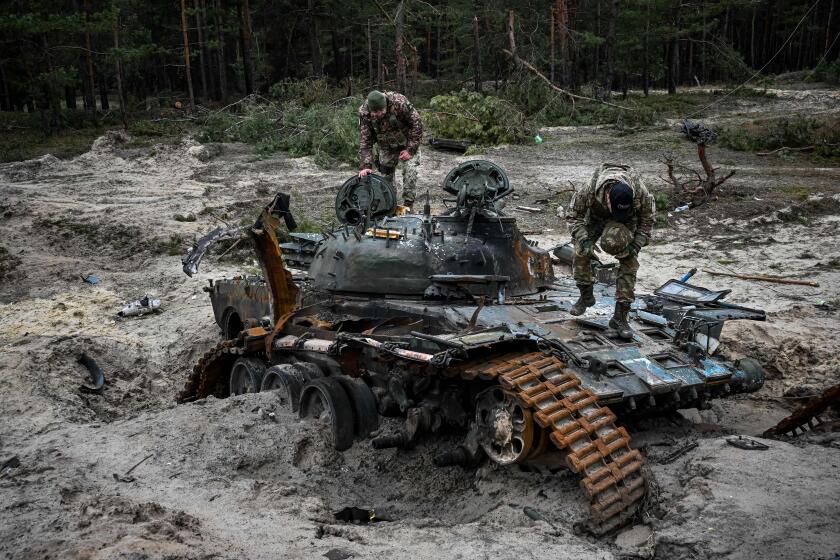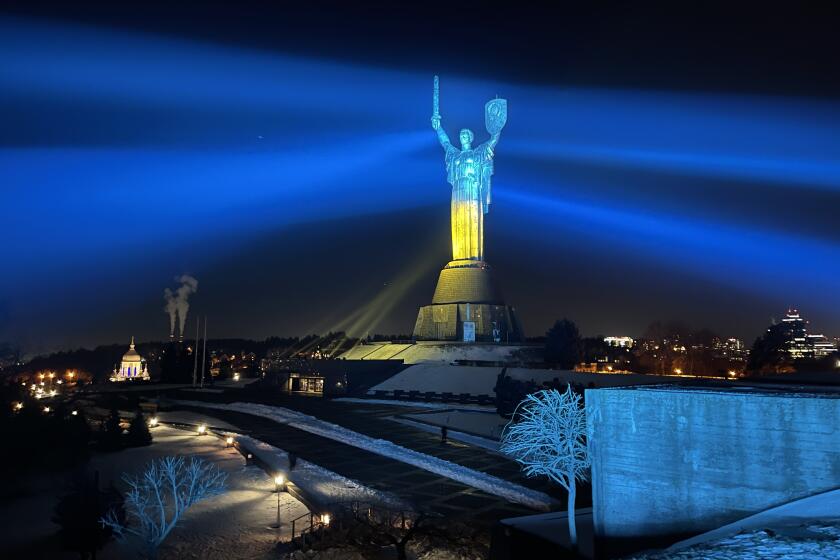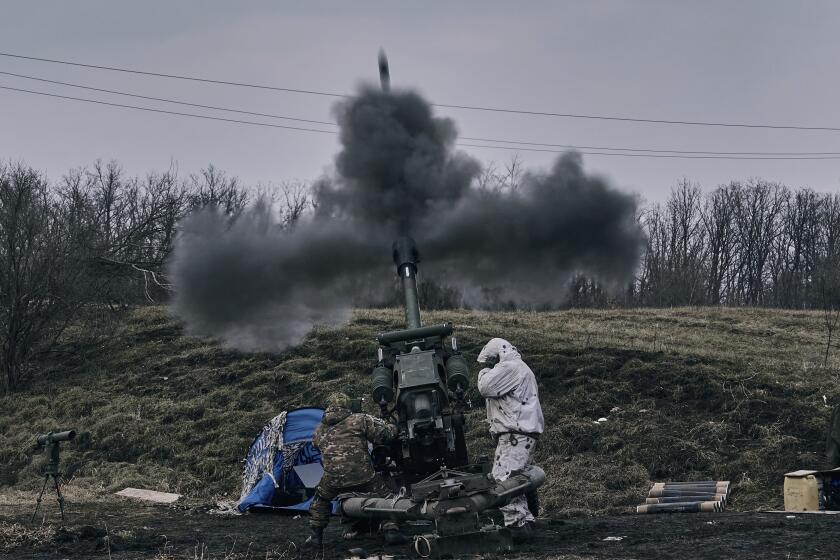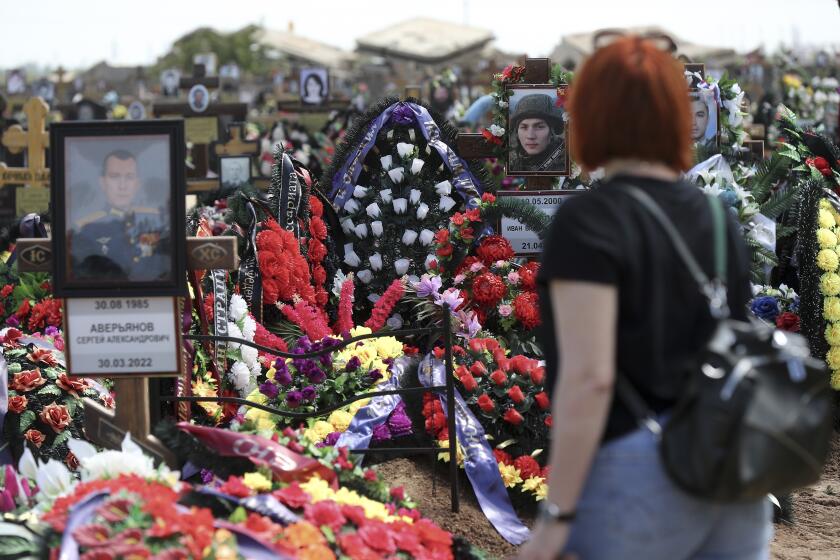Major Russian missile barrage strikes cities across Ukraine, including Kyiv
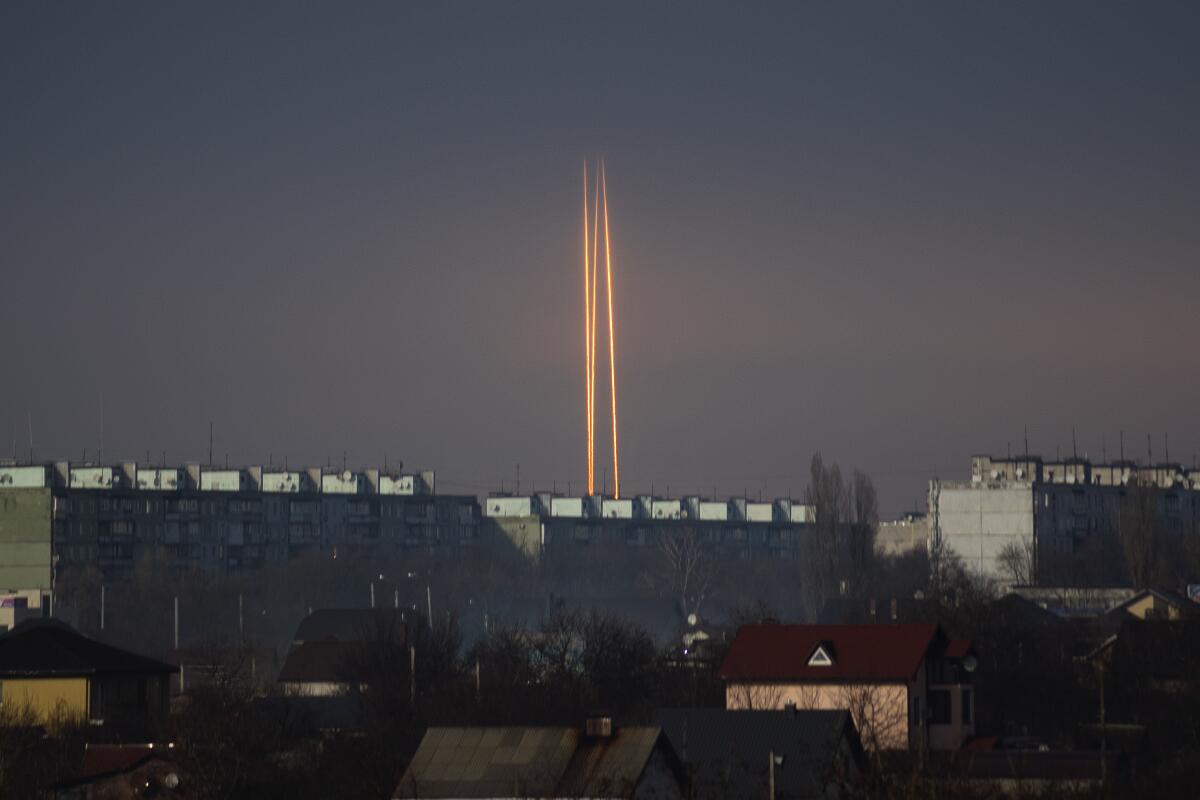
- Share via
KYIV, Ukraine — A barrage of more than 80 Russian missiles and a smaller number of exploding drones hit residential buildings and critical infrastructure across Ukraine on Thursday, killing six people and leaving hundreds of thousands without heat or electricity.
The largest such attack in three weeks also put Europe’s largest nuclear plant at risk by knocking it off the power grid for hours before it was reconnected. Nuclear plants need constant power to run cooling systems and avoid a meltdown, and the latest threat to the Zaporizhzhia power plant once again raised the specter of a nuclear catastrophe.
Air-raid sirens wailed through the night as the attacks targeted a wide swath of the country, including in western Ukraine, which is far from the front lines. President Volodymyr Zelensky described the barrage, which came as many people slept, as an attempt by Moscow “to intimidate Ukrainians again.”
The Russian Defense Ministry said the attacks were in retaliation for an incursion into the Bryansk region of western Russia a week earlier by what Moscow claimed were Ukrainian saboteurs. Ukraine denies the claim and had warned that Moscow could use the allegations to justify stepping up its own attacks.
The Kremlin’s forces started targeting Ukraine’s power supply in October in an apparent attempt to demoralize the civilian population and compel Kyiv to negotiate peace on Moscow’s terms. The barrages later became less frequent, with analysts speculating Russia may have been running low on ammunition. The last massive barrage took place Feb. 16.
The head of the United Nations’ nuclear watchdog agency said the Russia-controlled Zaporizhzhia nuclear plant lost all external power for 11 hours after its last remaining power line was disconnected following reports of the missile strikes. Rafael Grossi, director of the International Atomic Energy Agency, emphasized that the incident “again demonstrated how fragile and dangerous the situation is” for the plant.
Overall, Russia launched 81 missiles and eight exploding Iranian-made Shahed drones, according to Ukrainian armed forces commander Valerii Zaluzhnyi. Thirty-four cruise missiles were intercepted, as were four drones, he said. The mix of munitions makes it harder for air defenses to cope with the onslaught, military analysts say.
The Ukrainian military’s surrender hotline, dubbed ‘I Want to Live,’ is enticing some Russian soldiers to quit the battlefield as the war drags on.
Among the weapons were six hypersonic Kinzhal cruise missiles, which are among the most sophisticated weapons in the Russian arsenal, Ukrainian air force spokesman Yurii Ihnat said. Ukraine says it doesn’t have air defenses that can intercept them.
The Russian Defense Ministry said Thursday’s “massive retaliation” hit military and industrial targets in Ukraine “as well as the energy facilities that supply them.”
The missile strikes won’t take any toll on the Ukrainian army’s combat capability but are “playing on the nerves of the civilian population,” Ukrainian military analyst Oleh Zhdanov told the Associated Press.
In his evening video address to the nation, Zelensky struck a defiant tone.
“We have already shown what Ukraine is capable of,” he said. “And no matter how treacherous Russia’s actions are, our state and people will not be in chains. Neither missiles nor Russian atrocities will help them.”
Nearly half of households in the capital, Kyiv, were without heat, as were many in Kharkiv, Ukraine’s second-largest city, where the water supply was also cut on a day that temperatures were expected to be around freezing, according to local officials.
Monuments in the Ukrainian capital were built when Kiev answered to Moscow. The debate over what to do with them has gone in surprising directions.
Around 150,000 households were left without power in northwestern Ukraine’s Zhytomyr region. In the southern port of Odesa, emergency blackouts occurred because of damaged power lines.
Viktor Bukhta, a 57-year-old resident of a damaged residential building in Kyiv’s Sviatoshynskyi district, where officials said three people were wounded, said a missile landed nearby about 6:45 a.m.
“We went into the yard. People were injured, they helped, first-aid kits were handed out from the cars,” he told the Associated Press. “Then the cars caught fire. We tried to extinguish them with car fire extinguishers. And I got a little burnt.”
Grossi said he was “astonished by the complacency” of members of his agency in relation to the dangers faced by the Zaporizhzhia nuclear plant.
The owner of Russia’s Wagner Group military company says his forces have extended gains in Bakhmut in the war’s longest battle, but it’s unclear how long the fight might go on.
“What are we doing to prevent this happening? We are the IAEA — we are meant to care about nuclear safety,” Grossi told the agency’s board of directors in a meeting Thursday, according to an IAEA statement.
“Each time we are rolling a dice,” he said. “And if we allow this to continue time after time, then one day our luck will run out.”
In phone calls home, Russian soldiers in Ukraine tell loved ones of life on the front, including the killing of civilians and the looting of homes.
Grossi and others have called for the plant to be demilitarized, including the withdrawal of Russian troops. The Kremlin, which says its troops are needed to protect the plant, has rejected the idea.
Speaking at the IAEA meeting in Vienna, Russian envoy Mikhail Ulyanov said Moscow supports measures to prevent attacks against the plant. He challenged Kyiv to make a pledge to not shell the facility.
Russia and Ukraine have long traded accusations about their forces shelling the Zaporizhzhia plant.
Ukrainian Foreign Minister Dmytro Kuleba was scathing about the barrage, tweeting: “No military objective, just Russian barbarism.”
Smoke could be seen rising from a facility in Kyiv’s Holosiivskyi district, and police had cordoned off all roads leading to it.
Three men and two women were killed in the Lviv region after a missile struck a residential area, Gov. Maksym Kozytsky said. Three buildings were destroyed by fire, and rescue workers were combing through rubble looking for more victims, he said.
Breaking News
Get breaking news, investigations, analysis and more signature journalism from the Los Angeles Times in your inbox.
You may occasionally receive promotional content from the Los Angeles Times.
A sixth person was killed and two others wounded in multiple strikes in the Dnipropetrovsk region that targeted its energy infrastructure and industrial facilities, Gov. Serhiy Lysak said.
Aside from the hail of missiles, Russian shelling killed six other civilians from Wednesday to Thursday, Ukrainian officials said, including three people at a bus stop in Kherson.
More to Read
Sign up for Essential California
The most important California stories and recommendations in your inbox every morning.
You may occasionally receive promotional content from the Los Angeles Times.
